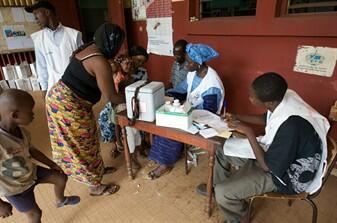
Large scale programmes to deworm all school children in low income countries as promoted by the World Health Organization, do not lead to the acclaimed educational and economic benefits, according to a newly updated Cochrane systematic review.
The authors, part of the international team from the Cochrane Infectious Diseases Group (CIDG) based at the Liverpool School of Tropical Medicine (LSTM), have added 4 new trials to their 2012 edition of the review, including one that recruited over one million children. They also drew on a new independent analysis from the London School of Hygiene and Tropical Medicine published at the same time this week of a pivotal trial that examined school attendance that demonstrated a number of problems with the conduct of the study and errors in the data analysis.
Soil-transmitted worms or helminths, including roundworms, hookworms, and whipworms, are common in tropical and subtropical areas and particularly affect children in low-income areas with poor sanitation. The World Health Organization (WHO), and organizations that include the Deworm the World initiative, recommend treating all school children at regular intervals with deworming drugs in areas were helminth infection is common. The assumption is that this treatment will improve nutritional status, haemoglobin and cognition which in turn will improve the health, intellect and school attendance and hence the economic productivity of the whole population of the country.
Given the important health and societal benefits attributed to these deworming programmes, described as one of the most effective ways of advancing the welfare of developing countries, and the considerable investment in delivering them, the CIDG critically evaluated the evidence. Two authors independently examined the results of 45 trials, some of which involved treating children known to be infected as well as community deworming programmes.
The authors found that while treating children known to have infections may improve weight gain, but no other evidence of benefit. Whilst it is obvious that children with worms should be treated to rid them of worms, this analysis challenges the current assumptions that such treatments consistently result in additional benefits, with the study showing that weight gains were confined to two studies conducted twenty years ago in one school in Kenya.
In terms of the routine deworming of school children, the authors found substantial evidence that deworming programmes do not show benefit in terms of nutritional status, haemoglobin, cognition or school performance, whilst the effect on school attendance was mixed and at risk of bias.
Included in the review was a re-analysis carried out by researchers at the London School of Hygiene and Tropical Medicine of a key trial conducted in Kenya in 1998-99 published this month. The original trial had found a link between deworming and increased school attendance and was the data which informed international policy and the heavy investment put into the programmes in the developing world. Their re-analysis showed substantive coding errors and problems with the way some of the data had been collected. The London School authors were concerned about bias in the way the school attendance data was collected, or whether the attendance had increased in that group due to the general health promotion programme accompanying the deworming. The results of this re-analysis have been published as two new papers in the International Journal of Epidemiology and call into question the validity of the results of the original trial.
Writing in a linked commentary piece published alongside the new papers in the International Journal of Epidemiology, the authors of the Cochrane Review call for policy makers to look again at the evidence in a systematic way in order to re-inform international policy. LSTM’s Paul Garner, who is a joint coordinating editor for CIDG, said: “Our view is that current promotion of community deworming is certainly a panacea: a single solution to multiple problems in low and middle income countries, and that the belief that deworming will impact substantially on economic development seems delusional when you look at the results of reliable controlled trials.”
Sources
Taylor-Robinson DC, Maayan N, Soares-Weiser K, Donegan S, Garner P. Deworming drugs for soil-transmitted intestinal worms in children: effects on nutritional indicators, haemoglobin, and school performance. Cochrane Database of Systematic Reviews 2015, Issue 7. Art. No.: CD000371. DOI: 10.1002/14651858.CD000371.pub6.
New re-analysis publications:
- Alexander M Aiken, Calum Davey, James R Hargreaves and Richard J Hayes. Re-analysis of health and educational impacts of a school-based deworming programme in western Kenya: a pure replication. International Journal of Epidemiology. DOI: 10.1093/ije/dyv127
- Calum Davey, Alexander M Aiken, Richard J Hayes and James R Hargreaves. Re-analysis of health and educational impacts of a school-based deworming programme in western Kenya: a statistical replication of a cluster quasi-randomized stepped-wedge trial. International Journal of Epidemiology. DOI: 10.1093/ije/dyv128
- Edward Miguel, Michael Kremer. Worms: Identifying Impacts On Education And Health In The Presence Of Treatment Externalities. Econometrica. DOI: 10.1111/j.1468-0262.2004.00481.x
- Findings from an expert panel at the Copenhagen Consensus 2012, including four Nobel laureates, who gathered to deliberate 32 new economic research papers and analyse the costs and benefits of different approaches to tackling the world‘s biggest problems. http://www.copenhagenconsensus.com/copenhagen-consensus-iii